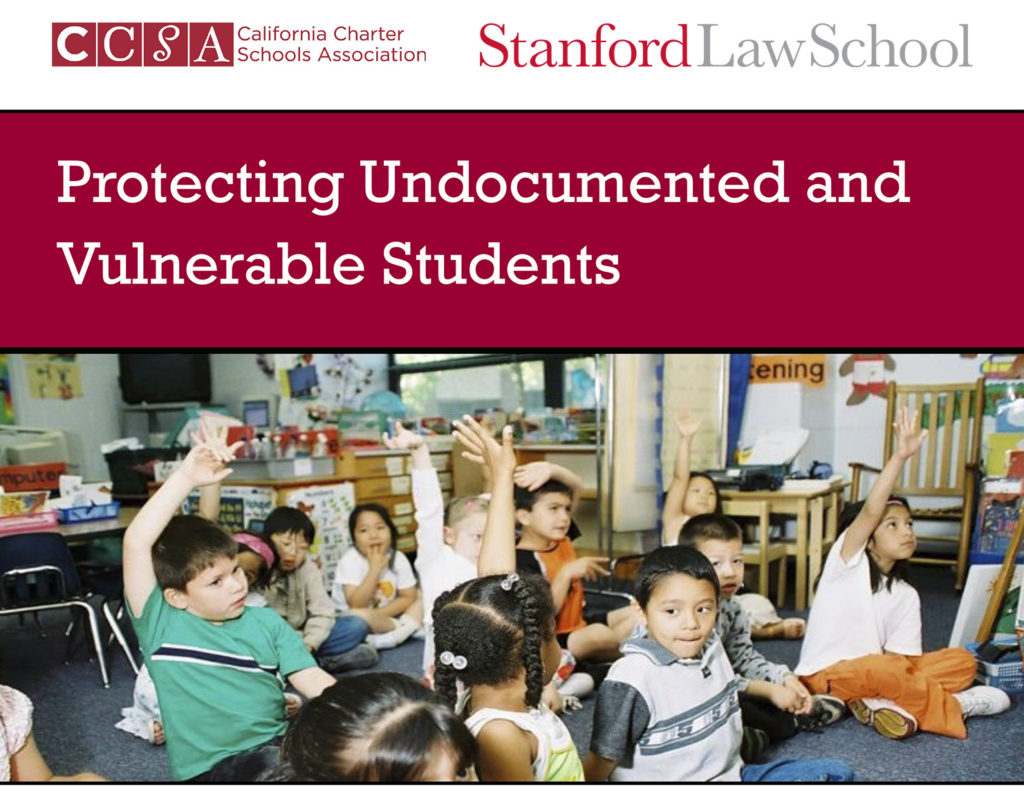Law School Clinic and Policy Lab Releases Guide to Help Schools Protect Undocumented and Vulnerable Students
The Stanford Law and Policy Lab and Stanford Law’s Youth & Education Law Project (YELP), on behalf of the California Charter Schools Association (CCSA), released a guide today to address increasing student absences and decreasing parental participation in California’s public charter schools among immigrant families in the wake of recent federal policy changes.
Recognizing those concerns, CCSA partnered with YELP and the Policy Lab to provide guidance to California’s public charter schools in how to ensure that the needs of all students are met in school. YELP clinic students Jonathan Berry-Smith (JD ’18), Sarah Brim (JD ’18), Carolyn Hite (JD ’18), and Ray Li (JD ’18), led by William Koski, Eric and Nancy Wright Professor of Clinical Education, and Michael Wald, Jackson Eli Reynolds Professor of Law, Emeritus, produced a report that provides schools with information regarding methods by which they can provide the highest quality education to undocumented students and students who have undocumented parents.
“All Californians want their schools to be safe and welcoming for children and their families—these guidelines will help administrators, teachers, and families create just such a learning environment,” said Koski. Added Wald, “The recommended policies and practices reflect sound educational policies that can benefit every child in California, not only undocumented students.”

Twelve percent of students in California are either undocumented or live with an undocumented parent, and one-third of children in the United States who live with an undocumented parent reside in California. In the 1982 case Plyler v. Doe, the U.S. Supreme Court ruled that states must provide all students access to a free public education regardless of the child’s immigration status. The report released today provides California’s charter schools with information surrounding their legal obligations to provide education to undocumented students and to fully protect the educational rights of undocumented students and students with undocumented parents.
The report promotes policies that are conducive to encouraging attendance, supporting parental involvement, and creating a safe space for all students in schools. It addresses four areas critical to fostering a high quality education for students affected by immigration status: facilitating school enrollment of undocumented students and students living with undocumented parents; regulating law enforcement access to students at schools; protecting students’ sensitive data in compliance with federal privacy laws; and helping schools adopt practices to assist students if a parent or caretaker is arrested.
“We are pleased to have partnered with Stanford Law School to provide this comprehensive resource for all public school leaders in California including our member charter public schools, seeking guidance on how to protect the most vulnerable students and their families that they serve,” said Ricardo Soto, Esq., Senior Vice President, Legal Advocacy, and General Counsel for CCSA. “We hope that the information that it provides will address the concerns that many public school leaders have in providing services to undocumented children and their parents so that they may continue to receive the highest quality education.”
About the California Charter Schools Association
The California Charter Schools Association’s vision is to increase student learning by growing the number of families choosing high quality charter public schools so that no child is denied the right to a great public education. Our mission is to ensure a million students attend charter public schools by 2022, with charter public schools outperforming non-charter public schools on every measure. We do this by serving as the advocacy organization that builds the policy environment needed to grow as quickly as possible the number of students attending high quality charter public schools.
About the Youth & Education Law Project
The Youth and Education Law Project was founded in 2001 by William Koski, the Eric and Nancy Wright Professor of Clinical Education at Stanford Law School. The clinic offers students the opportunity to participate in a wide variety of educational rights and reform work, including direct representation of youth and families in special education and school discipline matters, community outreach and education, school reform litigation, and policy research and advocacy.
About the Stanford Law and Policy Lab
The Law and Policy Lab at Stanford Law School is composed of students committed to improving public policy in a variety of fields. The Law and Policy Lab offers more than 20 practicums a year, in which law and other graduate students from Stanford get to work on a real public policy issue for a real client under the supervision of a faculty member. The practicums give students opportunities to develop knowledge about particular areas of public policy and the skills of policy analysis, including the ability to communicate policy findings.
About Stanford Law School
Stanford Law School is one of the nation’s leading institutions for legal scholarship and education. Its alumni are among the most influential decision makers in law, politics, business, and high technology. Faculty members argue before the Supreme Court, testify before Congress, produce outstanding legal scholarship and empirical analysis, and contribute regularly to the nation’s press as legal and policy experts. Stanford Law School has established a model for legal education that provides rigorous interdisciplinary training, hands-on experience, global perspective, and focus on public service, spearheading a movement for change.
